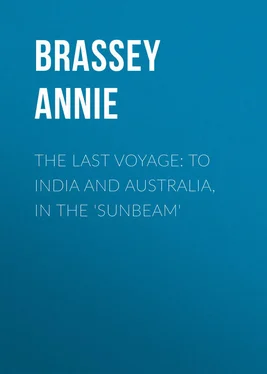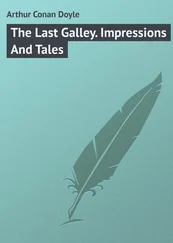Annie Brassey - The Last Voyage - To India and Australia, in the 'Sunbeam'
Здесь есть возможность читать онлайн «Annie Brassey - The Last Voyage - To India and Australia, in the 'Sunbeam'» — ознакомительный отрывок электронной книги совершенно бесплатно, а после прочтения отрывка купить полную версию. В некоторых случаях можно слушать аудио, скачать через торрент в формате fb2 и присутствует краткое содержание. ISBN: , Издательство: Иностранный паблик, Жанр: foreign_antique, foreign_prose, на английском языке. Описание произведения, (предисловие) а так же отзывы посетителей доступны на портале библиотеки ЛибКат.
- Название:The Last Voyage: To India and Australia, in the 'Sunbeam'
- Автор:
- Издательство:Иностранный паблик
- Жанр:
- Год:неизвестен
- ISBN:http://www.gutenberg.org/ebooks/29778
- Рейтинг книги:3 / 5. Голосов: 1
-
Избранное:Добавить в избранное
- Отзывы:
-
Ваша оценка:
- 60
- 1
- 2
- 3
- 4
- 5
The Last Voyage: To India and Australia, in the 'Sunbeam': краткое содержание, описание и аннотация
Предлагаем к чтению аннотацию, описание, краткое содержание или предисловие (зависит от того, что написал сам автор книги «The Last Voyage: To India and Australia, in the 'Sunbeam'»). Если вы не нашли необходимую информацию о книге — напишите в комментариях, мы постараемся отыскать её.
The Last Voyage: To India and Australia, in the 'Sunbeam' — читать онлайн ознакомительный отрывок
Ниже представлен текст книги, разбитый по страницам. Система сохранения места последней прочитанной страницы, позволяет с удобством читать онлайн бесплатно книгу «The Last Voyage: To India and Australia, in the 'Sunbeam'», без необходимости каждый раз заново искать на чём Вы остановились. Поставьте закладку, и сможете в любой момент перейти на страницу, на которой закончили чтение.
Интервал:
Закладка:
After a few years' residence at Clapham, your grandfather moved to Chapel Street, Grosvenor Place, and later to the house which you remember in Charles Street. At this period your mother's education was conducted by her attached and faithful governess, Miss Newton, whom you all know. She attended classes, but otherwise her life must have been even more solitary in London than at Clapham. Her evenings were much devoted to Botany, and by assiduous application she acquired that thorough knowledge of the science which she found so useful later, in describing the profuse and varied vegetation of the tropics.
And now I come to my engagement to your mother. How sweet it is to remember her as she was in those young days; in manners so frank and unaffected, and full of that buoyant spirit which to the end of her life never flagged. She enjoyed with a glad heart every pleasure. She was happy at a ball, happy on her horse, happy on the grouse-moor, devoted to her father, a favourite with all her relatives, and very, very sweet to me. Gladness of heart, thankfulness for every pleasure, a happy disposition to make the best of what Providence has ordered, were her characteristics.
We were married in October 1860. After our marriage we had everything to create – our home, our society, our occupations. We began life at Beauport; and wonderfully did your dear mother adapt herself to wholly unanticipated circumstances. Beauport became a country home for our nearest relations on both sides. As a girl, your mother had been a most loving daughter to her own father. After her marriage she was good and kind to my parents. To my brothers, until they were old enough to form happy homes of their own, she was an affectionate sister.
At the date of our marriage, no definite career had opened out for me. To follow my father's business was not considered expedient, and I had no commanding political influence. In the endeavour to help me to obtain a seat in Parliament, your dear mother displayed a true wife-like devotion. She worked with an energy and earnestness all her own, first at Birkenhead in 1861, and later at Devonport and Sandwich – constituencies which I fought unsuccessfully – and my return for Hastings in 1868 afforded her the more gratification. It had been the custom in the last-named constituency to invite the active assistance of ladies, and especially the wives of the candidates, in canvassing the electors. Your mother readily responded to the call. She soon became popular among the supporters of the Liberal party, and throughout my connection with Hastings she retained the golden opinions which she had so early won. Her nerve, high spirit, and ability, under the fierce ordeal of the petition against my return, have been described in his memoirs by Serjeant Ballantine, who conducted my case. He called your mother as his first witness for the defence, put one or two questions, and then handed her wholly unprepared to the counsel for the petitioners – the present Lord Chancellor. With unflinching fortitude your mother endured a cross-examination lasting for upwards of an hour. Her admirable bearing made a great impression upon the eminent judge (Mr. Justice Blackburn) who tried the case, and won the sympathies of the dense crowd of spectators. I remember how gratefully your mother acknowledged the mercy of Heaven in that crisis of her life. 'I could not have done it unless I had been helped,' were her simple words to me.
Down to the latest election in which I was engaged, your dear mother, in the same spirit of personal devotion to her husband, wrought and laboured in the political cause. I have put her love for me as the prime motive for her efforts in politics; but she had too much intelligence not to form a judgment of her own on public issues. Her sympathies were instinctively on the side of the people, in opposition to the old-fashioned Toryism, so much more in vogue a quarter of a century ago than it is to-day.
In helping me to hold a seat in Parliament, your dear mother was inflicting upon herself a privation very hard to bear. Owning to the rapid changes in all the circumstances of our lives, it was difficult to preserve old associations. In the midst of new environments, to make her way alone was a great strain. It is some consolation to know what happiness I gave when, upon my release from the urgent demands of Parliamentary and official life, I was able to spend much of my time in her dear society. It is sad that this happy change should have come so late.
In addition to the share which she took in my Parliamentary labours, your mother undertook the exclusive management at home. This responsibility was gradually concentrated in her hands, owing to my long service in the House of Commons, combined with exceptionally heavy extra-Parliamentary work, finally culminating in my holding office at the Admiralty for more than five years.
How we shall miss her in everything! specially in the task of arranging in the museum, now near completion, the combined collections of our many journeys! She had so looked forward to being able to bring together these collections in London; one of her objects being to afford instruction and recreation to the members of the Working Men's Clubs, to whom she proposed to give constant facilities of access to the collection.
The same spirit, which made your dear mother my helpmeet in my public life, sustained her, at the sacrifice of every personal predilection, in constant companionship with her husband at sea. She bore the misery of sea-sickness without a murmur or complaint. Fear in storm and tempest she never knew. She made yachting, notwithstanding its drawbacks, a source of pleasure. At Cowes she was always on deck, card in hand, to see the starts in the various matches. At sea she enjoyed the fair breezes, and took a deep interest in estimating the daily run, in which she was generally wonderfully exact. She had a great faculty for seamanship, and knew as well as anybody on board what should be done and what was being done on deck.
The same eager sympathy with every interest and effort of mine led your dear mother to help me as President of the Working Men's Club and Institute Union. She attended the meetings, distributed the prizes, and on one occasion entertained the members and their friends at Normanhurst. Upwards of a thousand came down from London, and were addressed by Lord Houghton and by M. Waddington, the French Ambassador. She also did all she could to encourage the Naval Artillery Volunteers. For years she attended inspections and distributed prizes on board the 'President' and the 'Rainbow.' She was always present at the annual service in Westminster Abbey. She witnessed the first embarkation in a gunboat at Sheerness. She carried through all the commissariat arrangements for the six hundred naval volunteers who were brought together from London, Liverpool, and Bristol for the great review at Windsor, sleeping under canvas for three nights in our encampment, and personally and most efficiently superintending every detail. The men were enthusiastic in their appreciation of her efforts.
The same interest was shown in my naval work. Your dear mother accompanied me frequently in my visits to the dockyard towns at home and abroad, attended naval reviews, and was present at the manœuvres on the coast of Ireland in 1885, and in Milford Haven in 1886. At home and abroad she always aided most cordially my desire to establish kindly relations with the naval profession, among whom she numbered, I am sure, not a few sincere friends. The same spirit of sympathy carried your mother with me on dreary and arduous journeys to Ireland, where she paid several visits to the Lough Swilly estates. She called personally on every tenant, asked them to visit the 'Sunbeam,' treated them most kindly, and won their hearts.
Her reception of the Colonial visitors to England last year, when suffering from severe illness, and the visits to the Colonies, which were the last acts of her life, are the most recent proofs which your dear mother was permitted to give of her genuine sympathy with everything that was intended for the public good. The reception which she met with in Australia afforded gratifying assurances of the wide appreciation of her high-minded exertions on the part of our Colonial friends.
Читать дальшеИнтервал:
Закладка:
Похожие книги на «The Last Voyage: To India and Australia, in the 'Sunbeam'»
Представляем Вашему вниманию похожие книги на «The Last Voyage: To India and Australia, in the 'Sunbeam'» списком для выбора. Мы отобрали схожую по названию и смыслу литературу в надежде предоставить читателям больше вариантов отыскать новые, интересные, ещё непрочитанные произведения.
Обсуждение, отзывы о книге «The Last Voyage: To India and Australia, in the 'Sunbeam'» и просто собственные мнения читателей. Оставьте ваши комментарии, напишите, что Вы думаете о произведении, его смысле или главных героях. Укажите что конкретно понравилось, а что нет, и почему Вы так считаете.









![John Bruce - The Lettsomian Lectures on Diseases and Disorders of the Heart and Arteries in Middle and Advanced Life [1900-1901]](/books/749387/john-bruce-the-lettsomian-lectures-on-diseases-and-disorders-of-the-heart-and-arteries-in-middle-and-advanced-life-1900-1901-thumb.webp)


